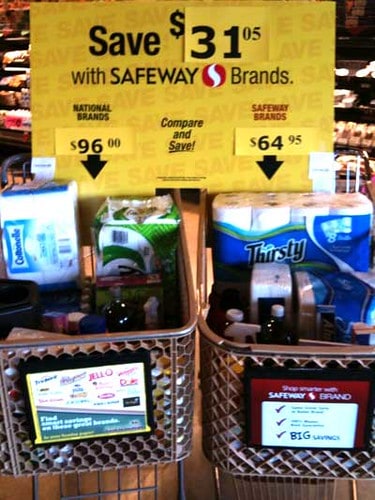The pitfalls of buying in bulk
This article was written by Sierra Black, a long-time GRS reader and the author of ChildWild, a blog where she writes about frugality, sustainable living, and getting her kids to eat kale. Previously at Get Rich Slowly, Black told us about sweating the big stuff.
Buying in bulk is great, right? You get the things you want and need, and pay less for them. As an added bonus, you don't have to shop as often (at least, this is a bonus for me, since I hate shopping).
Because I hate shopping and love discounts, I buy most everything in bulk: toilet paper, frozen foods, light bulbs, even toys. But bulk buying has its risks too, and after years of practicing it, I'm learning to see them.
Small amounts matter
This article is the fifth of a fourteen-part series that explores the core tenets of Get Rich Slowly.
Getting started with smart personal finance isn't always easy. It's one thing to read about the steps you should take, but it's another thing to actually do them. Your debt is so overwhelming or your saving goals so lofty that you begin to believe that the only way you'll ever get where you want to be is by winning the lottery.
Part of the problem is that we live in a society that idolizes the Big Winner. Nobody celebrates the guy next door who bikes to work, grows his own food and cooks his own meals, shops at the thrift store, and gets all his books from the library. That sort of life isn't glitzy. Yet it's that sort of life that can (and does) lead to true wealth.
Spend less than you earn
This is the third of a fourteen-part series that explores the core tenets of Get Rich Slowly.
When people ask me for my top tip on personal finance, they're often disappointed. My top tip isn't sexy. "To get out of debt and to build wealth," I say, "you must spend less than you earn." People are hoping for something more — some sort of mystical secret. But you know what? As mundane as it sounds, that is the mystical secret of money.
If you want to get out of debt and build wealth, all you ever need to do is spend less than you earn. Everything else we talk about at Get Rich Slowly is window dressing, a prop in support of the fundamental equation of personal finance:
Slash your grocery bill with store-brand products

If concern about taste has kept you from trying store-brand foods, hesitate no more. In blind tests, our trained tasters compared a big national brand with a store brand in 29 food categories. Store and national brands tasted about equally good 19 times. Four times, the store brand won; six times, the national brand won.
In other words, store brands offer roughly the same quality as national brands, but at a much-reduced cost. How much reduced? Consumer Reports says that the store brands they tested cost an average of 27 percent less than the name brand equivalents.
Sweating the Big Stuff
This article was written by Sierra Black, a long-time GRS reader. She writes about frugality, sustainable living, and getting her kids to eat kale at Childwild.com.

I will never forget coming home from the hospital with that precious little girl and looking around my huge suburban home with a sense of confused dread. "What happened to my apartment?" I said. "What happened to my life?" Continue reading...
How to shop at an estate sale
At 10am yesterday morning, Kris and I climbed into the Mini Cooper and to head for the county fair. We'd only been driving for a few minutes when Kris pointed at a sign. "Look! An estate sale," she said. "Let's stop."
Kris and I like estate sales better than garage sales because they usually feature nearly everything a person has ever owned — not just the cast-offs. Family members have generally pulled the plum pieces, but there are still plenty of treasures remaining to be found.
In this case, the treasures we purchased included: Continue reading...
Frugality in practice: Alternate modes of transportation
I've always been a car guy. It's not that I'm mechanically inclined or that I get into the latest makes and models — neither of these is anywhere close to the truth — but that a car has always been my primary mode of transportation.
When I was a boy, my family lived in rural Oregon, six miles from the nearest town. Automobiles were our only real option for getting around. Even when I went away to college, I relied on a car for most of my mobility. And so it's been for forty years. As I say, I've always been a car guy.
This summer, though, I've had a sort of epiphany, one prompted by your comments and suggestions. I've learned that I can save money and improve my fitness by leaving my car at home — by exploring alternate modes of transportation.
<Where to find free activities and events in your area
Our family has been going through a transformation from a paycheck-to-paycheck family to a family that has money in the bank. While I wouldn't say we are extreme frugalists, we do try to save as much money as we can, yet still provide excellent entertainment and learning opportunities for our family. Like J.D. (and many others!), we have struggled with finding that balance where we allow some fun while working to increase our financial health.
When it comes to entertainment, I think we are close to finding that balance. We do allow some money in our budget for that type of spending, but not much. We supplement our spending by enjoying as many free activities/events in our area as we can. But where do we find them?
The internet turned out to be a great resource for us and I thought I would share what I've learned with you. Of course, internet sources vary greatly depending on where you live so this is a generic list that I hope can be helpful to everyone. By all means, if you have suggestions, feel free to share with everyone in the comments!
How to Use Couchsurfing to See the World
What if I told you there was a different way to travel? A way to see the world outside of the hotel chains, guidebooks, and tourist traps. A way to intimately experience the real culture of everyday life. A way to connect with like-minded travelers and interact with some of the most hospitable locals you could possibly find.
Well, it's not too good to be true thanks to CouchSurfing.com. Sure, it takes some effort, a little kindness, and a dash of confidence. But let me reassure you, it's well worth it. My ultimate goal is to help take you from the "I would never do that" phase into the "huh, this might be something I should look into" phase. I hope simply to pass along just a small portion of the incredible amount of hospitality I've received from the site and the community in the last couple of months.
What exactly is Couchsurfing?
Technically, I believe it's referred to as a "hospitality exchange network". But in reality it's a social networking site, much like Facebook or Myspace, but that focuses on enabling fellow travelers to connect, meet, and even host each other. And yes, it's free.
An Experiment in Cheap Living (from 1872)
An Experiment in Cheap Living
Earlier this week, I shared some of the highlights from three years of GRS articles about saving money on food. Brett from The Art of Manliness, who knows that I collect old self-help books, sent me an excerpt from Dio Lewis's 1872 volume, Our Digestion, or, My Jolly Friend's Secret. Here Lewis describes his "experiment in cheap living", during which he spends just 54-1/4 cents for a week of food. This makes for some amusing reading. Enjoy!
It is now Saturday afternoon, and I will tell you in confidence, my dear reader, a little of my personal, private experience during the past week.